Pastor’s Word
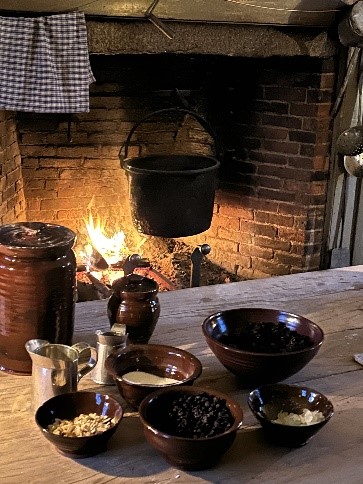
The Old and the New
by Rev. Racquel Ray, Associate Minister of Congregational Life
Happy New Year! The change of the calendar and the change in the weather bring also remembrances and renewals. Many of us review the previous year and resolve to make changes in the coming year. Some may choose to release actions that are not beneficial. And some may choose to add aspirational activities. I tend to ‘reset’ toward a simpler time.
Our family celebrates New Years Day with a simple meal of baked beans and brown bread. Years ago, (when we lived out of state) I would mail order Kenyon’s Corn Meal for Johnny Cakes for Shrove Tuesday (Mardi Gras). I baked Indian Pudding in a pumpkin shell for harvest dinner. Now, we grow pumpkins, corn, beans, and brew maple syrup in our own backyard. These old traditional recipes were the topic at a recent Coffee Chat where church members gather for tea, coffee and conversation.
After the recent culinary heaviness of the harvest and nativity holidays. I’m ready for new fare filled with old traditions. The cod fish and clam chowders, Johnny Cakes, corn bread, baked beans, Indian Pudding, roasted winter squashes, and hearty soups of New England history beckon from my antique recipe books. These old recipes are also economical, [mostly] plant-based, and locally sourced. Many of the ingredients are on hand from our garden harvest! My go-to cookbooks this time of year are The New England Butt’ry Shelf Almanac by Mary Mason Campbell, Olde New England’s Sugar and Spice and Everything by Robert Ellis Cahill, and The Tasha Tudor Family Cookbook by Winslow Tudor.
When I was young, a neighbor would invite me to visit after school. Mrs. [Natalie or Nan] Harris was a kind, older woman who was once a nurse at Massachusetts General Hospital. She had knee length grey hair that she wove in an Irish knot at the nape of her head and held it in place with hair pins. Her husband, Mr. [Bill] Harris had once played for Arthur Feidler in the Boston Pops and could play any instrument in the orchestra – and had one of each instrument in their house. Mrs. Harris taught me how to cook.

Mrs. Harris’ Cod Chowder
2lbs fresh cod fish cut into big chunks
1/2C finely chopped salt pork
1 stick of butter* dived in half (or dairy free of your choice)
1 large onion minced
6 celery stalks chopped
4 potatoes cubed
2 C broth (clam, fish, or if necessary chicken)
4 C milk (or cream*, half n half, or plain dairy free of your choice)
1 tsp each salt and pepper
*Nan had her dairy delivered and used fresh butter and milk for this recipe.
In a large soup pot saute the salt pork until crispy and brown. Remove the meat bits onto a paper towel covered plate and set aside. Add one half of the butter to the hot pan combining with the oil from the salt pork. Add onions and saute until translucent. Add the celery and saute until bright green. Add the potatoes. Add the broth and simmer until celery and potatoes are soft. Add the fish. Add the milk and salt and pepper and the remaining butter. Serve steaming hot in warm bowls with crispy salt pork bits sprinkled on top. (Nan would make sure each bowl also had a pad of fresh butter on top)

Johnny Cakes – thick or thin*
2 C Kenyon’s Corn Meal** (fine ground white flint corn)
2 C boiling water
1 tsp salt
Warm milk to thin the batter if needed
Heat a griddle to 380 degrees. In a large heat proof bowl combine the corn meal with boiling water and salt let stand for 5 minutes to soften the cornmeal. Add warm milk until the batter is to your desired consistency. Butter the griddle and scoop large spoonfuls of batter onto the griddle (like pancakes). Do not squish! Do not flip or peak for 6 minutes. After 6 minutes flip the Johnny cakes for another 6 minutes until golden brown. Serve with butter and maple syrup.
*Rhode Islanders are divided on this issue. Some prefer thin cakes (add more milk). Some prefer thick cakes (add less milk).
**Kenyon’s https://www.kenyonsgristmill.com/home.html is a RI historic mill and brand which was once ubiquitous but is now hard to find. It is still a working mill in Usquepaugh RI and is also available at Peter Potts Pottery https://www.peterpots.com/ . White flint corn is a variety indigenous to this area.
This is the time of year for warmth and health. For me, this means warm dinners and a wood fire crackling in the living room; a brisk walk outside in the warmest and sunniest part of the winter afternoon; and plenty of rest, nutrition, and hydration. And, as the calendar and season turns to new I am warmed by the old and healthy traditional recipes of olde New England.
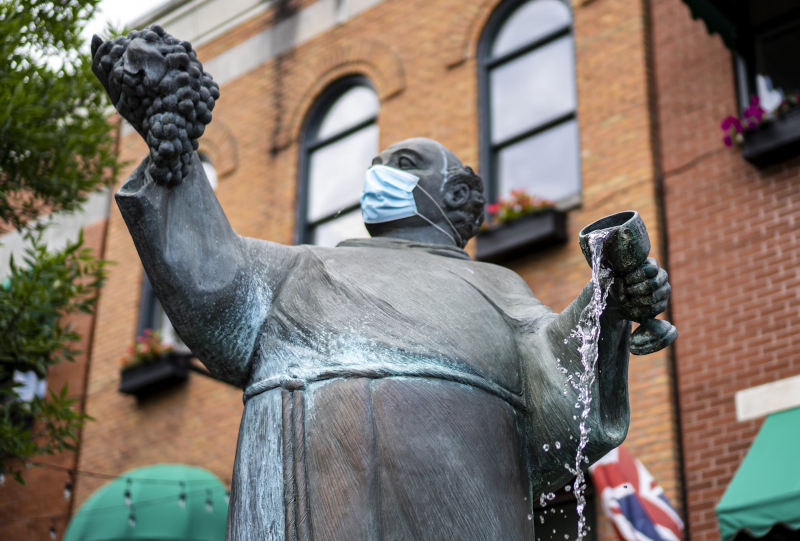
Are You Taking Care of Yourself?
by Rev. Dr. Dale Azevedo, Sr. Minister
Almost all of us in the church office are sick or have recently been sick.
That’s strange…although perhaps not unexpected.
What’s interesting is that none of us have the same thing, meaning we didn’t all give it to one another. That would be explainable. But each of us, in our own personal way, has been ill recently.
I say this is not unexpected because it is easy to get run down. We are currently in the midst of one of the busiest, most demanding, times of the year. The months from the end of October through the start of January sees four pretty major holidays: Halloween, Thanksgiving, Christmas, and New Years. Heaven forbid any of you also have birthdays, family anniversaries, of other celebrations like  Hannukah to add to the mix. There is so much going on and so many expectations placed on many of us that it is easy to get overbooked, overworked, and overtired. It’s also a highly emotional time of either great joy, great sorrow, or great stress! All this creates the perfect climate for getting sick.
Hannukah to add to the mix. There is so much going on and so many expectations placed on many of us that it is easy to get overbooked, overworked, and overtired. It’s also a highly emotional time of either great joy, great sorrow, or great stress! All this creates the perfect climate for getting sick.
Now, I can blame my COVID on travel. And other staff members can blame their ailments on hereditary or chronic health issues. That is all likely true. But being in the middle of this crazy season seems to fling open the doors of our immune systems and let every malady take root.
We need to protect ourselves.
We need to find ways of taking care of ourselves physically, emotionally, and spiritually.
Years ago, in one of my prior churches, I received a newsletter from the Parish Nurse/Health Ministry Network of the local hospital. The newsletter included a list of helpful tips for remaining healthy through the holidays. The tips may seem obvious and simplistic, but that doesn’t mean they aren’t relevant. Read through this list and see if there is anything within that you might find helpful during these last few weeks before Christmas.
 Stress-less tips for Surviving Christmas
Stress-less tips for Surviving Christmas
Take care of your body. Exercise. Stop eating when you’re full. Get plenty of sleep. Limit alcohol consumption. Don’t drink and drive…and fasten your seatbelt.
Take care of your spirit. Give yourself at least a couple of days to do what you want to do. Take time for worship and prayer. Make a list of the things you and your family enjoy about the holidays. Build traditions around those you enjoy most.
Realize that you are not solely responsible for making Christmas special for everyone else.
Don’t accept every invitation you receive. You can’t be everywhere!
If this is the first holiday after a divorce, death or end of a relationship, remove yourself from some of the reminders of the past. Do something you’ve never done before.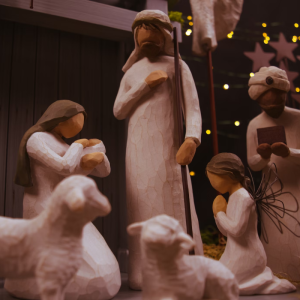
Give time and friendship rather than presents. Volunteer at a soup kitchen. Drive a homebound friend or neighbor around to see the holiday decorations.
Keep your sense of humor and count your blessings!
As we journey through this Christmas Season, it is important to remain physically, emotionally and spiritually healthy. This provides us with the best opportunity for a meaningful and spirit-filled celebration of the coming of Christ and the promise of new life. If Christ is to be born in us this Christmas, let us strive to make ourselves a healthy habitation for him.

Behold
by Rev. Racquel Ray, Associate Minister of Congregational Life
The people who walked in darkness
have seen a great light;
those who lived in a land of deep darkness—
on them light has shined.~ Isaiah 9:2, Matthew 4:16
Behold. Behold, beloved, is a term often used in the scripture to announce the presence of the Divine or the work or word of the Divine. ‘Behold’ informs the biblical reader that God’s revelation, or Theophany, is at hand. For example, “Behold, I am sending a messenger…” (Malachi 3:1), “Behold, a virgin shall conceive…” (Isaiah 7:4), or “Behold, I bring you good tidings of great joy, which shall be to all people…” (Luke 2:10). Behold, beloved, God is with us.
 These are the darkest days of the year. And for many of us the dwindling daylight is keenly felt in our psyche. I am a person who is very regulated around waking up at 5am and going to bed at 8pm (except for the occasional evening event or meeting!). And in the darkest days of the year, I’m ready to turn in even earlier! For some, the decrease in sunshine leads to seasonal affective disorder and even depression. Between now and January 8, 2025 the sun will rise a minute or two later each day. On the morning of January 9, 2025 the morning will begin to lengthen slightly each day until June. The afternoons with also shorten from now until December 12th. And the afternoons will begin to lengthen on December 13th.
These are the darkest days of the year. And for many of us the dwindling daylight is keenly felt in our psyche. I am a person who is very regulated around waking up at 5am and going to bed at 8pm (except for the occasional evening event or meeting!). And in the darkest days of the year, I’m ready to turn in even earlier! For some, the decrease in sunshine leads to seasonal affective disorder and even depression. Between now and January 8, 2025 the sun will rise a minute or two later each day. On the morning of January 9, 2025 the morning will begin to lengthen slightly each day until June. The afternoons with also shorten from now until December 12th. And the afternoons will begin to lengthen on December 13th.
I refer to the days between December 12th and January 9th as Halcyon Days – those days of stillness around the winter solstice. I write about this every year. Halcyon Days is a fairly amalgamous term which generally means days of nostalgia and reminiscing. It refers to the Ancient Greek tale of the Halcyon (or Kingfisher) and is referenced by Shakespeare when referring to days of remembering good times.
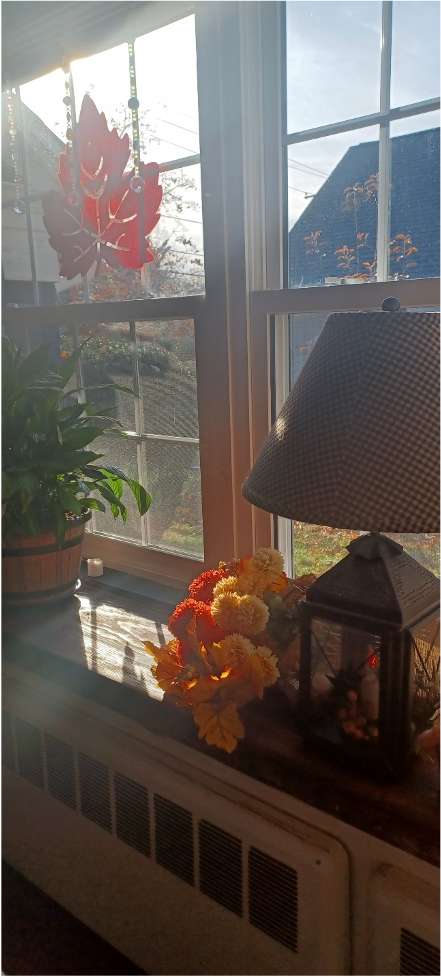
In our modern Christian world, these days of course are celebrated in a flurry of Advent, Christmas, and New Years activities. But, there’s an undercurrent of sparkling sunny afternoons, long and clear frosty nights, and chilly mornings. In these days, my Spirit yearns for sunshine!
In the morning, I like to sit in my favorite chair as the sun beams break over the horizon and through the old glass panes of the front door, across the living room and into my eyes. At breakfast, the sunshine hits my dining room window and I like to sit in the sunny spot while I eat and sip coffee. In the afternoon, the sun radiates through the picture window and onto my favorite ‘napping chair’, warming my feet and face. These are the days when there is a short window of opportunity in the afternoon for a walk – the warmest part of the day but before the early sunset and returning evening chill.
This year, I feel the compounding darkness of the season and the collective community response to the election. A group of inter-faith community members joined the Barrington Interfaith Partners in the BCCUCC library on the Monday evening before election day. Each person present was asked to share their name and one word that they were holding in their hearts. The collective majority said the word ‘hope’.
I think it is important to remember that even if many of those present did not hear the results they were expecting, their ‘hope’ is still present.The text quoted above from Isaiah and Matthew is the opening to the story of Jesus. It continues:

For a child has been born for us,
a son given to us;
authority rests upon his shoulders,
and he is named
Wonderful Counselor, Mighty God,
Everlasting Father, Prince of Peace.
7 Great will be his authority,[a]
and there shall be endless peace
for the throne of David and his kingdom.
He will establish and uphold it
with justice and with righteousness
from this time onward and forevermore.
The zeal of the Lord of hosts will do this.
Behold, beloved, light breaks forth in the darkness as the morning sunshine breaks forth over the horizon. Hope is present just as the sparkling afternoon sunshine twinkles on the ponds and rivers around town. The Great Light that shines upon us, among us, in us, and through us is the presence of God. And, even in the shortest days of the year, there is much to celebrate, observe, and find hope therein. Behold, Beloved, Behold.
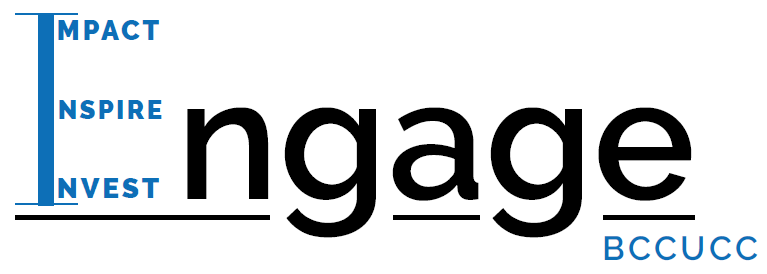
ENGAGE: Impact
by Rev. Dr. Dale Azevedo, Sr. Minister
Dear friends and members of BCCUCC,
Did you hear Kim Fernandez share in church on Sunday? She did a wonderful job talking about the IMPACT BCCUCC has had on her and her family. From growing up in the church singing in the children’s choir, to attending mission trips with the youth group, to the tremendous support her family received following the death of her sister, and now to raising her own kids in the church, BCCUCC has had a deep impact on Kim’s life. And do you know who made that impact? YOU!
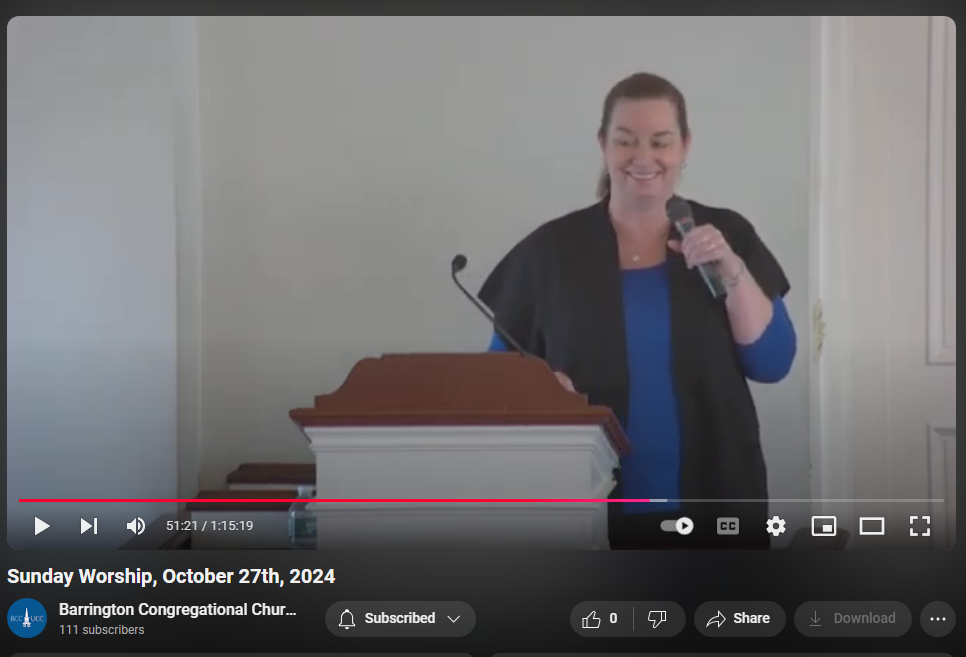
(If you missed Kim, you can watch her here. Her talk begins at the 50:00 mark.)
Because you and others are engaged in the church, you have had an incalculable impact on people’s lives.
When Elizabeth and I consider all that we give to the church, our gift grows from our appreciation for the impact our church on our members, throughout the community, and around the world. Our generosity, in all its forms, comes from our expressions of gratitude for this ministry. I hope you will consider joining us, Kim, and so many others in making a commitment to be engaged in our church this coming year.
This year, our annual stewardship campaign is focusing not only on the financial gifts we offer, but on all the different ways we give. If we are to continue making an impact on people like Kim and her family, then it takes a commitment from all of us to give of our time, our talents, and our treasure.
Over the next few weeks in church, you’ll hear people like Kim encourage us to consider all the ways in which we give. We will imagine what more our church could do if we could break free of the shackles of scarcity of time and money. We will hold a ministry fair, Ye Olde Ministry Faire, highlighting all the way you can get involved in our ministry. And we’ll challenge one another to consider how we can each be more engaged over the year to come.
 All of this will conclude on November 17, when we celebrate Consecration Sunday. On that day we will take time in worship to consecrate all our gifts (time, talent, and treasure) with a special liturgy. Then, following worship, everyone is invited to join us for a congregation-wide lunch, catered by Blue Kangaroo.
All of this will conclude on November 17, when we celebrate Consecration Sunday. On that day we will take time in worship to consecrate all our gifts (time, talent, and treasure) with a special liturgy. Then, following worship, everyone is invited to join us for a congregation-wide lunch, catered by Blue Kangaroo.
God has made, and continues to make, a remarkable IMPACT on the lives of our members and community. Your engagement in our congregation makes this possible. I hope you will join me in turning in a commitment card on Consecration Sunday, celebrating all the ways you plan to ENGAGE with our ministries over the coming year.
Thank you for joining me in being a part of Barrington Congregational Church, UCC.
Blessings,
![]()
Rev. Dr. Dale Azevedo
Sr. Minister, BCCUCC

Mental Wellness
by Rev. Racquel Ray,
Associate Minister of Congregational Life
Are you feeling particularly uneasy these past few years? We are in unstable and sometimes scary times. When we watch the news, we see images of natural disasters, violence, political discord, pandemic, and war. We are conditioned to be afraid of pending tragedy with commercials for life insurance, car insurance, home title insurance, and even insurance for our handheld tech. We are bombarded with offers for the latest medications which might ease our various discomforts and illnesses as though comfort and ease are perpetually possible as promised. Our times can often feel Biblical and apocalyptic – especially as we watch news from the Middle East. And, as we have come through the Covid pandemic, we are all still seeking post-traumatic resiliency from the tragic losses we all suffered. Is it any wonder we are uneasy?!
I have often found comfort in the 23rd Psalm. It was a comfort to me throughout the pandemic as I presided over so many funerals and it is a comfort as we wade through our challenges now. This version is from The Message version of the Bible:
God, my shepherd!
I don’t need a thing.
You have bedded me down in lush meadows,
you find me quiet pools to drink from.
 True to your word,
True to your word,
you let me catch my breath
and send me in the right direction.
Even when the way goes through Death Valley,
I’m not afraid when you walk at my side.
Your trusty shepherd’s crook
makes me feel secure.
You serve me a six-course dinner
right in front of my enemies.
You revive my drooping head;
my cup brims with blessing.
Your beauty and love chase after me
every day of my life.
I’m back home in the house of God
for the rest of my life.
The Psalm is dichotomously comforting and disquieting. We remember it from so many funerals and times of grief. And, yet, we are soothed by the imagery of God as a shepherd whose love will never leave us isolated. But, many of us are still feeling lonely and isolated.
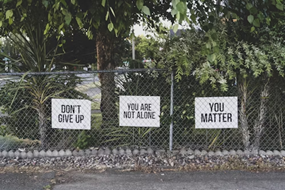 In fact, our uneasiness – or dis-ease – has become a secondary epidemic. In 2023, the US Surgeon General published a report on the Loneliness Epidemic; Our Epidemic of Loneliness and Isolation 2023 The U.S. Surgeon General’s Advisory on the Healing Effects of Social Connection and Community.1 The report details the social connections which are necessary for our flourishing and the harm caused by their absence. People flourish with strong social infrastructure in their local communities. We thrive with connections, access to healthcare, healthy digital environments, and communities. The connections we make and the ministries we share at church are major factors in our mental wellness.
In fact, our uneasiness – or dis-ease – has become a secondary epidemic. In 2023, the US Surgeon General published a report on the Loneliness Epidemic; Our Epidemic of Loneliness and Isolation 2023 The U.S. Surgeon General’s Advisory on the Healing Effects of Social Connection and Community.1 The report details the social connections which are necessary for our flourishing and the harm caused by their absence. People flourish with strong social infrastructure in their local communities. We thrive with connections, access to healthcare, healthy digital environments, and communities. The connections we make and the ministries we share at church are major factors in our mental wellness.
 Here, we find rest for our weary [news worn] souls. We find support for our grief. We find connections with people, creativity, art, music, and the Spirit. We find worship and bereavement. We share fellowship and fun. We laugh, cry, sing, and pray together. Our congregation is one antidote to the loneliness and isolation that many of us are feeling. In addition to isolation and loneliness many of us are also challenged by: Grief, Serious mental illness diagnosis, Caregivers of those with mental health challenges, Major depression, Bipolar, Schizophrenia, Eating disorders, PTSD, Anxiety, Substance Abuse, Addictions.2 Many are also impacted by neuro-differences and LGBTQIA+ realities.
Here, we find rest for our weary [news worn] souls. We find support for our grief. We find connections with people, creativity, art, music, and the Spirit. We find worship and bereavement. We share fellowship and fun. We laugh, cry, sing, and pray together. Our congregation is one antidote to the loneliness and isolation that many of us are feeling. In addition to isolation and loneliness many of us are also challenged by: Grief, Serious mental illness diagnosis, Caregivers of those with mental health challenges, Major depression, Bipolar, Schizophrenia, Eating disorders, PTSD, Anxiety, Substance Abuse, Addictions.2 Many are also impacted by neuro-differences and LGBTQIA+ realities.
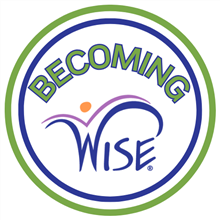 The Southern New England Conference of the United Church of Christ (SNEUCC) voted at its annual meeting in the summer of 2024 to become a W.I.S.E. (Welcoming, Inclusive, Supportive, and Engaged) Conference. Members of the SNEC Health and Wellness Ministry has begun the process of becoming designated as a W.I.S.E. Conference by the UCC Mental Health Network. Recognition of the SNEUCC efforts is seen here: https://vimeo.com/989159593. The UCC Mental Health Network W.I.S.E. program encourages congregations and conferences along a path of exploration, conversation, and education to increase awareness and reduce the stigma of mental illness. Discussing issues of mental health challenges opens the door to acceptance and healing.3 Do we want to explore becoming a W.I.S.E. certified church here at BCCUCC?
The Southern New England Conference of the United Church of Christ (SNEUCC) voted at its annual meeting in the summer of 2024 to become a W.I.S.E. (Welcoming, Inclusive, Supportive, and Engaged) Conference. Members of the SNEC Health and Wellness Ministry has begun the process of becoming designated as a W.I.S.E. Conference by the UCC Mental Health Network. Recognition of the SNEUCC efforts is seen here: https://vimeo.com/989159593. The UCC Mental Health Network W.I.S.E. program encourages congregations and conferences along a path of exploration, conversation, and education to increase awareness and reduce the stigma of mental illness. Discussing issues of mental health challenges opens the door to acceptance and healing.3 Do we want to explore becoming a W.I.S.E. certified church here at BCCUCC?
This Sunday, October 6th, 2024, we will be supporting the Neighbors in Need special offering which this year is directed toward Mental Health Justice. October 10th is Mental Health Day. Our worship service on Sunday will include prayers and preaching on the realities of our collective Mental Wellness challenges. Let us continue the work of wellness and justice.
Works Cited
1 Vivek H. Murthy, M. M. (2023). O ur Epidemic of Loneliness and Isolation 2023 The U.S. Surgeon General’s Advisory on the Healing Effects of Social Connection and Community. Washington DC: US Department of Health and Human Services.
2 SNEUCC Health Ministry. (2024, July). Being Wise. Retrieved from Southern New England Conference United Church of Christ: https://www.sneucc.org/WISE
3 Deborah Ringen, C. s. (2022, August 23). Blogs. Retrieved from Southern New England Conference United Church of Christ: https://www.sneucc.org/blogdetail/snec-to-become-a-w-i-s-e-conference-16610483
What’s NOT in the Obituary
by Rev. Racquel Ray,
Associate Minister of Congregational Life
On September 7, 2024, my mother-in-law passed away. Irene Deanna Ray, affectionately known as Annie was the matriarch of the Ray clan. She was eight-five years old and had survived several previous rounds of breast cancer along with a stroke and a heart attack. The love of her life, Art (GySgt Arthur Ray, USMC, Retired), survived WWII, Vietnam, and Korea and succumbed to Parkinsons in 1995. Annie had been a widow for nearly 30 years. She was a devoted Anglican Episcopalian whose faith was demonstrated in her service to her church, her love of ministry, and her zeal for prayer.
My relationship with Annie can be summed up in Titus 2:3-5 (New International Version):
3 Likewise, teach the older women to be reverent in the way they live, not to be slanderers or addicted to much wine, but to teach what is good. 4 Then they can urge the younger women to love their husbands and children, 5 to be self-controlled and pure, to be busy at home, to be kind, and to be subject to their husbands, so that no one will malign the word of God.
 Annie warmly embraced me as one of her own. She offered the wisdom of the older woman to a younger woman; faith, family, and friendship were shared in abundance. She taught me about things I missed out on in childhood: Disney movies, children’s stories, nursery rhymes, sewing, knitting, cooking, and crafting. She was full of stories of raising her own children in the church and adventures in scouting. Her recipes were from an old Campbell’s Soup Cookbook, the Girl Scout camping recipes, or from Betty Crocker and were mostly made in one pot. Classic Ray family recipes such as Aunt Dora’s Dump Cake, All-in-One Hamburger Dinner, One Pot Spaghetti, Beanies and Weenies, and Hungry Boy Casserole are all favorites of my kids. She would call me with prayer requests from her congregation and kept us on their prayer list too. We referred to ourselves as Mrs. Ray (the older) and Mrs. Ray (the younger). Our new daughter-in-law is Mrs. Ray (the youngest).
Annie warmly embraced me as one of her own. She offered the wisdom of the older woman to a younger woman; faith, family, and friendship were shared in abundance. She taught me about things I missed out on in childhood: Disney movies, children’s stories, nursery rhymes, sewing, knitting, cooking, and crafting. She was full of stories of raising her own children in the church and adventures in scouting. Her recipes were from an old Campbell’s Soup Cookbook, the Girl Scout camping recipes, or from Betty Crocker and were mostly made in one pot. Classic Ray family recipes such as Aunt Dora’s Dump Cake, All-in-One Hamburger Dinner, One Pot Spaghetti, Beanies and Weenies, and Hungry Boy Casserole are all favorites of my kids. She would call me with prayer requests from her congregation and kept us on their prayer list too. We referred to ourselves as Mrs. Ray (the older) and Mrs. Ray (the younger). Our new daughter-in-law is Mrs. Ray (the youngest).
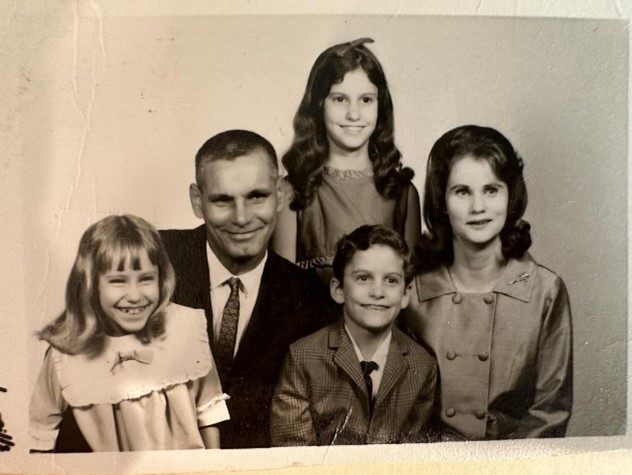 Annie was born in 1938 at a time when families were coming out of The Great Depression. She was frugal and saved her bacon grease in a coffee can. She saved bread crusts for breadcrumbs and made her own ‘Bisquick’ with self-rising flour and shortening. She saved scraps of fabric for crazy quilts and reused her tea bags. She made preserves and pickles along with candied orange peels and ‘turkey bone soup’ from the Thanksgiving leftovers.
Annie was born in 1938 at a time when families were coming out of The Great Depression. She was frugal and saved her bacon grease in a coffee can. She saved bread crusts for breadcrumbs and made her own ‘Bisquick’ with self-rising flour and shortening. She saved scraps of fabric for crazy quilts and reused her tea bags. She made preserves and pickles along with candied orange peels and ‘turkey bone soup’ from the Thanksgiving leftovers.
 Our kids adored Annie. Our son, especially, loved Annie’s cooking and on the first day of her visits, Christian would take Annie to the grocery story with the list of favorite dishes and a list of ingredients (which we don’t usually stock in the pantry) for those classic Ray family recipes. She read stories to them with all of the characters having separate voices. She emphasized the importance of church and education.
Our kids adored Annie. Our son, especially, loved Annie’s cooking and on the first day of her visits, Christian would take Annie to the grocery story with the list of favorite dishes and a list of ingredients (which we don’t usually stock in the pantry) for those classic Ray family recipes. She read stories to them with all of the characters having separate voices. She emphasized the importance of church and education.
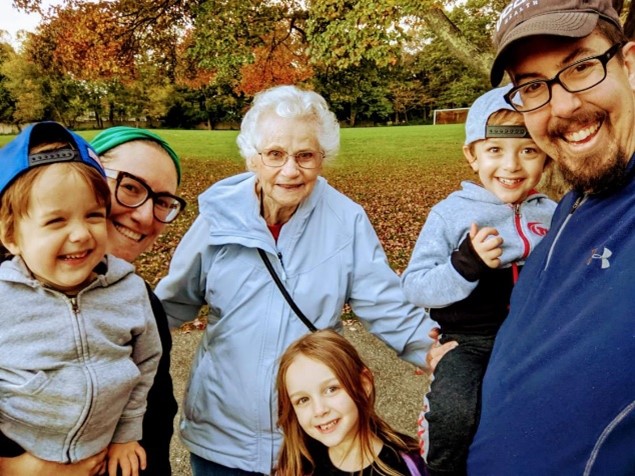 Annie and Papa left a legacy. With eight grandchildren and eight great grandchildren, the Ray family has grown. Papa was orphaned during childhood and joined the Marines at age 16. It was his dream that his grandkids would go to college and all of them did; some chose professional certification. They left us all with a legacy of service to country, church, and family. They left us with a collection of thrifty and delicious recipes and a lifetime of memories and stories.
Annie and Papa left a legacy. With eight grandchildren and eight great grandchildren, the Ray family has grown. Papa was orphaned during childhood and joined the Marines at age 16. It was his dream that his grandkids would go to college and all of them did; some chose professional certification. They left us all with a legacy of service to country, church, and family. They left us with a collection of thrifty and delicious recipes and a lifetime of memories and stories.
In the past few weeks, I’ve been reminded of the importance and sacredness of staying connected with family. Our siblings, kids, grands, and nieces and nephews are the treasures and the joys of our [sometimes challenging] lives. May Annie’s (and Papa’s) souls and the souls of all the dearly departed rest in peace.
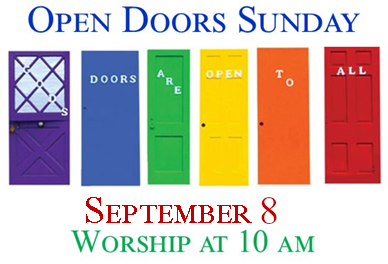
Come home!
by Rev. Dr. Dale Azevedo, Sr. Minister
“Come home, come home.
You who are weary, come home.”
Will L. Thompson
Come Home
September 8 is Open Doors Sunday. As many of you know, that is the official kickoff of our 2024-2025 program year. It comes at a time that our kids have gone back to school, our boaters lament the passing of summer, and our staff and lay leaders get busy. It is a really fun day in the life of the church, and recently we’ve celebrated that day with a fun, full worship service followed by a cookout and party after church.
I want to invite you to join us for this special Sunday and come back home to church. We have so much planned for you. In worship we have the dedication of our volunteers for children’s ministries, a baptism of the cutest little boy since the last one, a great sermon by Racquel, and a special musical guest. And if that isn’t enough, afterward we’ll have hot dogs, an ice cream truck, activities for the kids, and fellowship.
But not only that, we have so much planned for this fall that you will definitely want to be a part of!
Your sermons
This summer Racquel and I preached a season of grab-bag sermons! We didn’t know what our sermon topic would be until we pulled your suggestions out of a bag. And it was wild! However, there were dozens of sermon suggestions we didn’t get to. And they were great! So, Racquel and I decided to use those suggestions to populate our sermon schedule for this fall. The best part is we get to plan ahead, this time! So this fall we will be preaching your special requests from the summer with topics like:
What is prayer and what does it accomplish?
With so many religions, who is the real God?
What are heaven and hell really like?
How do we coexist with those we disagree with?
Did God stop talking?
The challenge of forgiveness.
It’s likely we’ll publish the list along with anticipated dates later so you won’t miss the sermons that really peek your interest. So, come home and listen to your sermons!
Your family
Whether you  attend by yourself, with friends, or with your kids/parents, your family will be at church! Who is your family? Everyone who attends! We talk about church being a family more than a group of friends for a variety of reasons. First, you don’t get to choose your family and you don’t get to choose who comes to church. Like our families of origin, we don’t control who comes through the doors, yet we hold many shared experiences in common. Also like your family, there are probably those you get along with a whole lot better than others! (Aint that the truth!)
attend by yourself, with friends, or with your kids/parents, your family will be at church! Who is your family? Everyone who attends! We talk about church being a family more than a group of friends for a variety of reasons. First, you don’t get to choose your family and you don’t get to choose who comes to church. Like our families of origin, we don’t control who comes through the doors, yet we hold many shared experiences in common. Also like your family, there are probably those you get along with a whole lot better than others! (Aint that the truth!)
However, also like family we are here for you when you need us most. We may not agree on everything and we may upset one another at times, but we are called to truly care for one another, to love one another. Where else can you find that? Where do you find it in your life? We pray together. We live together. We laugh together. We cry together. We grow together. That is family, and you are welcome here! Come home and see your family!
Your faith
One of the most common statements I’ve heard from congregation members over the past few years is, “I have nowhere else in my life where I can talk about my faith like this. I can’t talk with my spouse, my friends, and certainly not my coworkers. This is the only place I can discuss what really matters to me.” Whether it is in worship, or Bible study, or a fellowship group, church is one of the VERY few places in our lives where people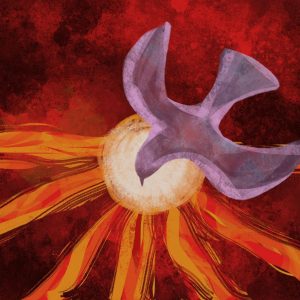 feel they can discuss God and ask their questions freely. What a gift that is! Do you have questions about the meaning of life, God, what happens after we die, or even what it is you believe? Then this place is for you. Come home and explore your faith!
feel they can discuss God and ask their questions freely. What a gift that is! Do you have questions about the meaning of life, God, what happens after we die, or even what it is you believe? Then this place is for you. Come home and explore your faith!
Your ministry
How do you live out your faith? What do you do in your life that God would look upon and say, “Well done, my good and faithful servant?” There are so many ministry opportunities here at your church. Just go to our web page and explore our Ministries tab or take a look at our list of current ministry teams. There are so many to choose from. And what’s even better is if you don’t see one that interests you there, you can always start a new one. Our vision for ministry at BCCUCC is that every member, no matter how old or young, skilled or unskilled, faithful or doubting, should have a place to be in ministry. Church isn’t just a place to come and learn and find connection, it’s also a place to make a difference. Come home and get involved in your ministry!
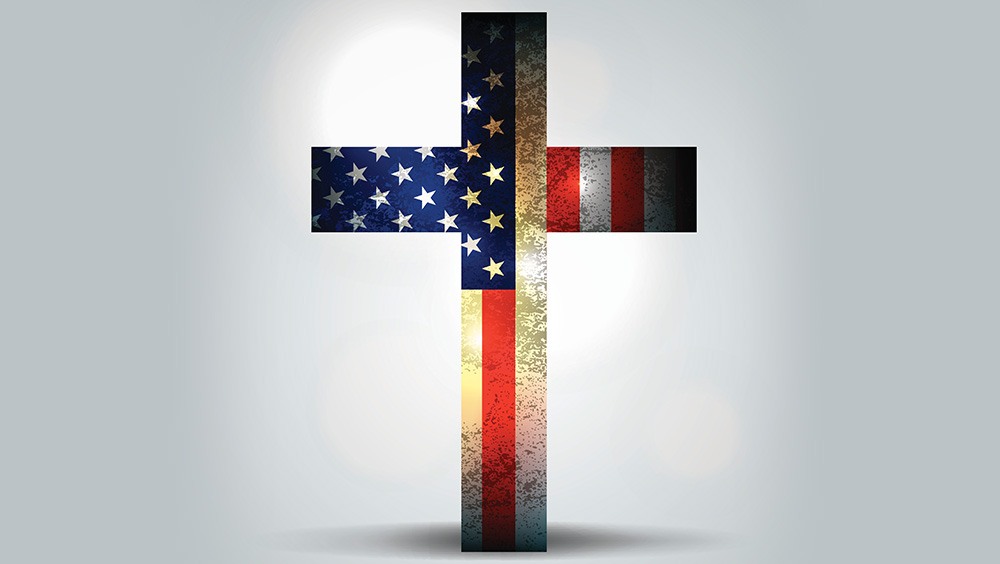
What is Christian Nationalism and why does it matter?
by Rev. Dr. Dale Azevedo, Sr. Minister
A few weeks ago, during our first grab-bag sermon, I referred to Christian Nationalists adding the commentary that their ideals aren’t particularly Christian or patriotic. This was my sermon on kindness and humility where I discussed the “fruits of the Spirit” (June 23) as the Biblical test of true faithfulness. Following that sermon, one of our members approached me and asked if I could clarify what I meant by Christian Nationalism and who might fall into that category. I happily agreed to do so. However, as I began to put my thoughts together, I realized that it might make for a relevant blog instead of a one off response to an individual’s question. So here goes:
What is Christian Nationalism and why does it matter?
To understand Christian Nationalism, we must first understand nationalism and what is meant by the term. Nationalism is not patriotism.1 Patriotism is a love of one’s country and a celebration of all this is good about it. Nationalism, instead, is a belief that people can be easily categorized by one’s nation of origin and that one’s personal identity is defined by the general characteristics and moral code of that nation. For example, an American can be easily defined by a core set of values present in the larger culture and that they are distinctly different from an Iranian, a Pole, or a Brazilian. Often accompanied with this understanding is a belief that one’s own nationalism is inherently better than another’s and that it must be protected or it, along with its advantages, will be lost.2 We have witnessed a rise in nationalism in politics throughout the world in recent years.
So, what is Christian Nationalism?
Christian nationalism is a particular brand of nationalism that sees Christian faith as the primary characteristic that defines American identity. It states that American morals and culture are defined by our Christian roots and that those morals and values must be protected or America, as it has been, will cease to exist. Christian nationalism is one of the forces at the forefront of what many are calling our current culture war, and it has been becoming increasingly mainstream in American politics.
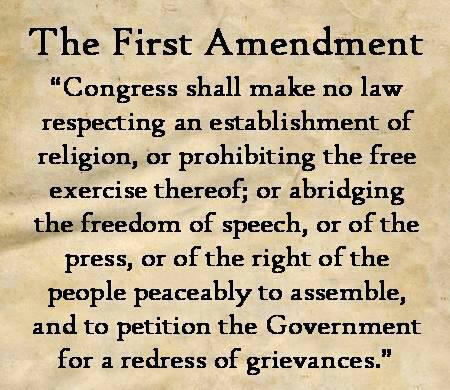
Why is it a problem?
Many would argue that our politics and social views ought to be informed by our religious faith. I would be one of these. Our faith should influence who we vote for, what laws we support, and what values we hold dear. If it doesn’t, then what purpose does our faith have? However, Christian nationalism isn’t just about encouraging people to vote according to their beliefs. It is about using the political system to enshrine one set of religious beliefs as law for all. It is about diluting or ending the separation of church and state by using the government’s power to give primacy to one interpretation of faith over any other.3 This is a threat to all Americans (Christian and non-Christian) whose views do not directly align with those in power.
How is it becoming mainstream?
In the past, Christian Nationalism has been characterized by those living on the extremes: white nationalists, white supremacists, and others often characterized as hate groups. However, over the past year we have seen an increasing number of examples of Christian nationalism in mainstream politics.
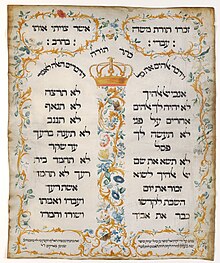
Louisiana: In June, Gov. Jeff Landry signed a bill that required state’s public schools, colleges, and universities to display a poster of the Ten Commandments in every classroom. The Ten Commandments have long been a lightning rod for political discourse. Many argue that they are the basis of our legal system and ought to be seen as a public document rather than a religious one. However, we cannot divorce the religious aspects of the Ten Commandments from the legal. They are, and always have been, a religious document. And as such, we have to ask ourselves which version of the Ten Commandments will be displayed and who will describe them to the students when questions are raised? Roman Catholics, Protestants, and Jews all have different versions of the Ten Commandments. We number them differently. We write them in different languages. And we interpret them very differently. Who determines which version is the legal version and which interpretation is allowed (and which is not!). This seems like a thinly veiled attempt to have the state give privilege to one faith, and one interpretation of that faith, over all others.
Oklahoma: Later in June, the state of Oklahoma went even farther than Louisiana when state school superintendent mandated Biblical education in all public schools for grades 5-12. This is both a violation of the authority granted to local school districts in Oklahoma to determine their own curriculum as well as a direct violation of the First Amendment of the Constitution which forbids government establishment of any religion. Again, it raises the great question of whose Biblical interpretation will be taught in the public schools? And can the Bible be taught as myth or folklore, or will it be taught as truth? And if so, who’s truth? This mandate is a clear example of Christian nationalism as it is intended to indoctrinate the children of Oklahoma into one state-sponsored faith and value system, even rejecting the diversity present in modern Christianity.
US House of Representatives: The US House of Representatives has always been characterized as the more rambunctious house of legislation and often had its share of political radicals.  Currently we have members such as Alexandria Ocasio-Cortez and Ilhan Omar as well as Marjory Taylor Green and Matt Gaetz sharing more extreme positions on the left and right respectively. This is nothing new. However, Mike Johnson, who is the current Speaker of the House, ideally a more moderate and powerful position, has openly embraced Christian nationalistic ideals. While he has refrained from calling himself a Christian nationalist, as other congress members have recently done,4 his talking points are not far from theirs. In a 2016 interview he was quoted as saying, “Over the last 60 or 70 years our generation has been convinced that there is a separation of church and state . . . most people think that is part of the Constitution, but it’s not.” And more recently, “The founders wanted to protect the church from an encroaching state, not the other way around.”5 All of this is intended to erode the long held American ideal of the separation of Church in state in favor of establishing one set of beliefs, a conservative Christian one, as the de facto rule of law in the U.S.
Currently we have members such as Alexandria Ocasio-Cortez and Ilhan Omar as well as Marjory Taylor Green and Matt Gaetz sharing more extreme positions on the left and right respectively. This is nothing new. However, Mike Johnson, who is the current Speaker of the House, ideally a more moderate and powerful position, has openly embraced Christian nationalistic ideals. While he has refrained from calling himself a Christian nationalist, as other congress members have recently done,4 his talking points are not far from theirs. In a 2016 interview he was quoted as saying, “Over the last 60 or 70 years our generation has been convinced that there is a separation of church and state . . . most people think that is part of the Constitution, but it’s not.” And more recently, “The founders wanted to protect the church from an encroaching state, not the other way around.”5 All of this is intended to erode the long held American ideal of the separation of Church in state in favor of establishing one set of beliefs, a conservative Christian one, as the de facto rule of law in the U.S.
The Barrington Times: Finally, a very local example – many of you are undoubtedly aware of the organized campaign against our town’s appointed DEI commission. It made weekly appearances throughout the winter and spring in the opinion section of the Barrington Times with letters to the editor listed under the names of various townspeople. Of all their letters attacking these appointed volunteers, one letter is most relevant for our conversation here. It was entitled “DEI’s Godless Agenda” and was published in early weeks of May.6 What I find most disturbing about this hurtful letter is that many of the members of the DEI commission are either clergy or active laypeople in our local churches and synagogue. The author(s) knew this, and still chose to attack them as “godless” as a part of their political attacks. Again, this carries the strong undertones of Christian nationalism, suggesting only one interpretation of faith is “godly” and acceptable in our national discourse.
America Was Founded on Religious Pluralism.
Reading through our national history, there is no doubt that the United States has roots deeply embedded in Christianity. Our own forebearers, the founders of our church, were decedents of the Puritans, the settlers who came over on the Mayflower and founded the Massachusetts Bay Colony. In the subsequent decades, colonists settled throughout the eastern seaboard, also bringing with them their Christian faith. The influence of these early Christian settlers on our national identity and values is undeniable. However, there was not just one understanding of Christianity in the colonies. There were different and conflicting ideas of faith between each of the colonies and each of  the cultural groups that came to the continent. And many of them came here to escape government sponsored religious persecution in their home country. That is why the founders of this country were so clear in providing for religious freedoms in our national and constitutional framework. Their Christian expressions were just as diverse as ours are today.
the cultural groups that came to the continent. And many of them came here to escape government sponsored religious persecution in their home country. That is why the founders of this country were so clear in providing for religious freedoms in our national and constitutional framework. Their Christian expressions were just as diverse as ours are today.
This early understanding of religious tolerance (on a national level, not always on a local level) opened the doors for people of other faiths to come to our nation and became part of the reason it is so great today. Christian nationalism seeks to rewrite this part of American history. It seeks to recast the nation we know and love, one that has experienced religious diversity from its earliest days, as a nation of one dominant faith, espousing one set of values, and relegating all else as un-American. This reality threatens not only our neighbors of other faiths or no faith, but it threatens us, faithful Christians who may interpret our beliefs differently than those in power. As Christians, as Americans, we must fight against this trend.
Where can I learn more?
You can see the many footnotes that I included in my blog. I encourage you to read further on this issue. One of the things I found most encouraging as I wrote this blog was the number of evangelical (i.e. often more conservative or traditional) Christians who wrote about the dangers of Christian nationalism. These are not just the concerns of progressive Christians. It is a concern for all Americans who wish to practice their faith without the intrusion of governmental opposition.
Here are some of the sources I found most interesting:
-
- “What Is Christian Nationalism?” by Paul D. Miller, Christianity Today, February 3, 2021
- “What Is Christian Nationalism, Exactly?” by David French, New York Times, Feb. 25, 2024
- “Christian Nationalism Explained: An Interview with Rutgers Professor Joseph Williams” by John Chadwick, rutgers.edu, Mar. 4, 2021
- “Christian Nationalism Doesn’t Just Threaten Our Nation – It Threatens Our Faith” Compassionate Conservative Revival
- “The Truth About Christian Nationalism” Evangelicals for Democracy
I hope you found this blog interesting and informative.
Blessings to you,
Dale
- “What Is Christian Nationalism?” by Paul D. Miller, Christianity Today, February 3, 2021
- “What Is Christian Nationalism, Exactly?” by David French, New York Times, Opinion, Feb. 25, 2024
- “Christian Nationalism Explained: An Interview with Rutgers Professor Joseph Williams” by John Chadwick, rutgers.edu, Mar. 4, 2021
- “Josh Hawley Doubles Down on Christian Nationalism Remarks” by Khaleda Rahman, Newsweek, Jul. 10, 2024 and “Americans are getting more accepting of Christian nationalism” by A. Shortle et. al. The Washington Post, Sept. 1, 2022
- “The Christian Nationalism of Speaker Mike Johnson” by A. Whitehead and S. Perry, TIME, October 27, 2023
- I recently tried to find the direct link to this letter on the Barrington Times website. Unfortunately, that letter no longer appears to be in their archive. I was only able to find follow-up letters which referenced the original letter by name. The original letter likely appeared in the May 3rd or May 10th edition of the Barrington Times.
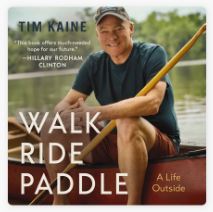
Go Outside
by Rev. Racquel Ray,
Associate Minister of Congregational Life
Christianity is an embodied faith. Beginning with the Incarnation of Jesus, humans are called to relationship with God in body, mind, and spirit. Paul’s letters speak much about the flesh; our temptations, our faults, and our shortcomings. But, even with the limitations of the human condition, we are still called and enabled to embody our faith. Sometimes, our church voices are mind and spirit centric and overlook the embodied elements of our spiritual practice.
This summer, I’m reading Sen. Tim Kaine’s book, Walk, Ride, Paddle: A Life Outside. I’m enjoying Tim’s descriptions of the Virginia landscape through the Appalachian Trail, State Parks, National Parks, roadways, and waterways. He recreates the visceral impact of the land and water through narratives of temperature, precipitation, flora, fauna, and geology. The story follows Tim’s journey of a three-year exploration of his state as he hikes, bikes, and kayaks the natural resources.
I am reminded of my desire to ‘be a tourist in my hometown’. In years past, it was my praxis to ‘tour’ the town in which I lived. I would visit historical societies, museums, and walk or ride by the historic ‘plaque’ houses. When our family lived in Idaho, we spent every other weekend camping in either a State Park or a National Park. We would attend the Ranger Talks and participate in any park exploration activities. Our kids were Junior Rangers.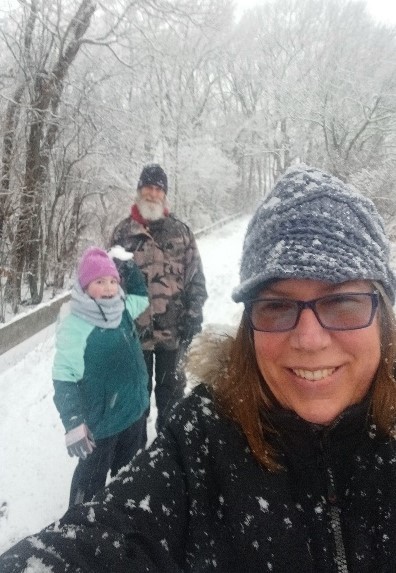
With the exception of Roger Williams Park in Providence and Blackstone River Valley my National Park Pass has been collecting dust for about seventeen years. We’ve visited the New Bedford Whaling Museum and the Friendship in Salem. But, we have not been able to explore as much of New England as we did of Idaho. Regrettably.
Reading Tim’s book brought me back to the joy of being outside – and NOT working on a project. We spend a lot of time outside in the gardens and yard which helps to feed our family. We need to reconnect with being outside for fun, pleasure, relaxation, and connection – and Spiritual wellness.
Christianity is an embodied faith. So, reconnecting our physical bodies with the natural world is also a spiritual practice. Cohabitating with all of creation as creatures of the Creator brings us to a calm, centered, groundedness, and connection that only comes from the natural environment.
Our family has only recently discovered the Sowams Woods Trail in Barrington. After living here for over seventeen years, we decided to explore our neighborhood and discovered this natural gem. Halfway through the trail we came across a metal sculpture with a sign and a QR code. We found our first RI Walks Creature and that led us to the RI Walks Creature Challenge https://www.riwalks.org/challenge.php where we found resources to explore other RI nature trails in a fun and interactive way.  The RI Walks website says, “Hidden along 34 trails are unique steel-creature sculptures inspired by nature. These creatures can be difficult to find, but when you see one, you’ll know that you’ve found a very special place! Each creature has a QR code for you to scan and track your progress, and when you have found all 34 you will be a challenge winner and win some great prizes!” That’s for me!
The RI Walks website says, “Hidden along 34 trails are unique steel-creature sculptures inspired by nature. These creatures can be difficult to find, but when you see one, you’ll know that you’ve found a very special place! Each creature has a QR code for you to scan and track your progress, and when you have found all 34 you will be a challenge winner and win some great prizes!” That’s for me!
Among all of the wonderful and delicious summer activities that are culturally outside in Rhode Island, I’m partial to the beach, clam boils, Riverside Creamery (small vegan coffee sugar cone with jimmies), the pool, gardening, back yard cookouts, at home fireworks show, catching fireflies, and hanging laundry outside to dry. This year, I’m going to add finding some creatures along the 34 RI Walks.

What is your spiritual practice outside going to be? What appeals to you and your connection to creation? How will you Go Outside? (And if it’s a lobster bake on the beach please let me know!)

Grab-bag Summer Sermon Series
by Rev. Dr. Dale Azevedo, Sr. Minister
It should be no surprise to those of you who have been around for a while that Racquel and I like to share a sermon series over the summer. Two years ago we had the summer of Elijah (wohoo!) and last year we had Women of the Bible. So, I bet you have been waiting with bated breath on the announcement of what series we will do this summer…
Well, Racquel and I are going out on a limb. We are going to hold a grab-bag summer sermon series!
“What is a grab-bag summer sermon series?” you ask. It’s a lot like it sounds. Everyone is invited to bring a sermon topic with them, place it in a bag with all the others, and then Racquel or I will draw from the bag and preach on whatever theme we draw out. We will do this new each week. So if you bring a suggestion week 1 you will need to bring it again in future weeks. There is no sense in us preaching on your topic on a week you aren’t there!
So as we prepare to begin this experiment on Sunday, here are a few questions you may be asking:
Are you serious?
Yes. In fact, it sounds fun. Or rather, I should say, it sounded fun when Racquel and I decided to do it. Now, it’s actually a bit nerve-racking. But I have learned a few things over my years of ministry. One is this, that pastors can get stuck in a rut. Pastors can get in a preaching groove where they unknowingly start repeating the same sermons or sermon ideas over and over. We do it in new ways, but it can often be the same (or similar) message. It can get stale for the listeners. Another thing I’ve learned is that congregation members have great ideas for sermons. You know what’s on your mind, what questions you have, what you’ve been struggling with or excited about recently. And yet, the preacher may never preach the sermon you want to hear. That’s because we may not know it’s on your mind. This series gives you the chance to request the sermon you want to hear, and we’ll do our best to preach you through it!
do it. Now, it’s actually a bit nerve-racking. But I have learned a few things over my years of ministry. One is this, that pastors can get stuck in a rut. Pastors can get in a preaching groove where they unknowingly start repeating the same sermons or sermon ideas over and over. We do it in new ways, but it can often be the same (or similar) message. It can get stale for the listeners. Another thing I’ve learned is that congregation members have great ideas for sermons. You know what’s on your mind, what questions you have, what you’ve been struggling with or excited about recently. And yet, the preacher may never preach the sermon you want to hear. That’s because we may not know it’s on your mind. This series gives you the chance to request the sermon you want to hear, and we’ll do our best to preach you through it!
Aren’t you scared?
You bet. I said above that it was “nerve-wracking”. When Racquel and I agreed to do this, it sounded fun, fresh, and exciting. Now that it is less than 72 hours away it is starting to weigh on me a bit. But I know two things: 1) God will be with us on Sunday and we’ll get through this one way or another. Jesus said, “Do not worry about what you will say or how you will say it, for it will be given to you in that hour; for it is not you who speaks but the Holy Spirit.”* And 2) we’ll be in this together. Racquel and I are not preaching alone but will have you present to back us up and share your thoughts as well!
How is this going to work?
This is a great question. I first thought this would work well when both Racquel and I were present. One of us could lead a chunk of the service while the other spent time in prayer and contemplation. However, this will seldom be the case as we are each away a number of weekends through the summer. So Racquel and I will each have our own way of doing it. I plan on drawing the sermon topic at the start of worship and then taking time during hymns and other moments to be in prayer  and look things up in the Bible. Also, we may look to you for help. These sermons may be more of a dialogue exploring an issue than the typical sermon monologue you are used to. We may bounce ideas off each other. The last thing is that you may get to experience our sermon development process. Some weeks a sermon may come to us all at once in a flash. Other weeks, we may labor over different ideas, change and grow our perspectives, all in a process of getting to a final idea or main point. You may get to experience this first-hand!
and look things up in the Bible. Also, we may look to you for help. These sermons may be more of a dialogue exploring an issue than the typical sermon monologue you are used to. We may bounce ideas off each other. The last thing is that you may get to experience our sermon development process. Some weeks a sermon may come to us all at once in a flash. Other weeks, we may labor over different ideas, change and grow our perspectives, all in a process of getting to a final idea or main point. You may get to experience this first-hand!
What topics should we include?
I would say there are no limits to what you should include. If your kids are going to stay in worship with you, then they should be encouraged to ask questions too. What you submit in the grab-bag can be a special theme, a scripture verse, a Bible story or person, or even a question that is weighing on your heart. I would recommend that you do not be super specific about your sermon idea. For instance please don’t say, “I want you to preach on how Jesus condemns non-Christians and is clear about this when he says, ‘I am the truth, the light, and the way.'” That may be a good sermon for you to preach, but is not for me. Instead say, “Can you preach on what Jesus meant when he said, ‘I am the truth, the light, and the way.'” or “Does Jesus condemn all non-Christians when he says, ‘I am the truth, the light, and the way.'” These latter options will allow Racquel and I some freedom to be honest to what we believe and what we feel the Spirit is calling us to share with you.
Will you preach on anything?
No. Racquel and I will hold veto power on the sermon topic. We will be open to being challenged to share a sermon on just about any topic, but there may be issues or topics we feel will be too volatile or divisive to preach off the cuff. In these cases, we may wish to hold onto that topic and address it another day when we have had more time to prepare ourselves and you for the message. Otherwise we’ll preach on anything from hotdogs, to batman, to the eschatological ramifications of predestination.
anything from hotdogs, to batman, to the eschatological ramifications of predestination.
What if this doesn’t work?
That might happen. We’re trying something new, fun, and hopefully engaging. Like anything new, it may not work. It may be too nerve-wracking for Racquel and I or we could just feel it isn’t as engaging as we thought. If that’s the case, one or both of us will switch gears and return to a more traditional style.
Is this going to be every week?
That’s the plan. Don’t worry this isn’t going to be the forever future where Racquel and I never prepare a sermon again. This is something unique for the summer. Also, I will say, we have a few weeks where we will have a guest preacher over the summer. Our guests are not obligated to follow this pattern. They will likely bring their message to you in a more traditional manner.
So that’s that. I hope you are looking forward to this experiment as much as Racquel and I are (or were?). If you have other questions hopefully they will get answered over the weeks ahead. Otherwise, we look forward to seeing you on Sunday and exploring what fascinating questions, ideas, or topics you may have for us.
* Mark 13:11


